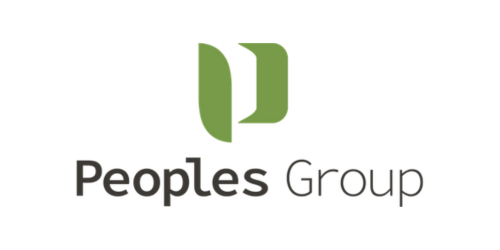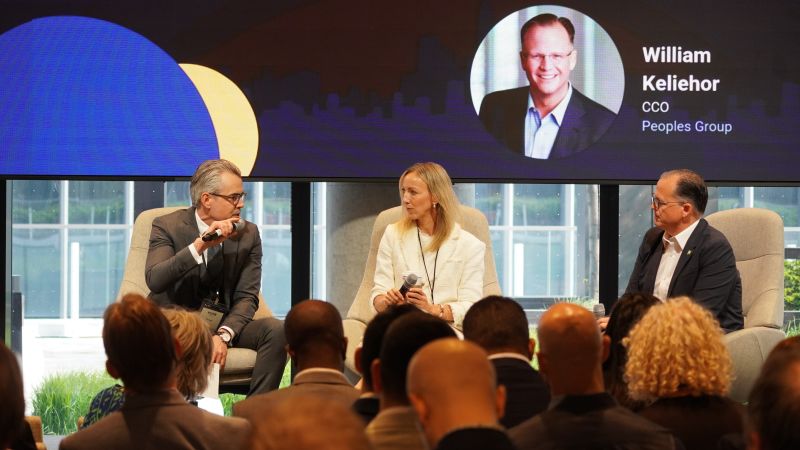Fueling Fintechs: The Hidden Opportunity for Canadian Banks
Abstract: In this panel on fueling fintech in Canada, Pamela Draper (DC Bank) and William Keliehor (Peoples Group), moderated by The Logic’s Kevin Carmichael, explored the growing momentum in the Canadian fintech sector amid regulatory delays and global opportunities. Draper emphasized the rise of homegrown innovation, the need for clear open banking rules, and DC Bank’s strategy of staying focused on payments infrastructure rather than retail banking. Keliehor highlighted Peoples Group’s role powering fintechs, the importance of open banking, RPAA, and better capital deployment in Canada. Both panelists called for faster regulatory progress, fairer access to Interac, and stronger public demand to push fintech modernization forward.

Kevin Carmichael: It’s an extraordinary time globally, and I think it’s important to begin with a broad lens. Pamela, of all the things that can impact a growing fintech business, what’s top of mind for you lately?
Pamela Draper: It’s a broad topic, but one major theme is the rapidly changing political landscape in Canada and the U.S. For Canadian fintechs, we’re seeing increased interest in working with homegrown partners, which is an opportunity.
In Canada specifically, changes like the upcoming real-time rails (RTR)—which we’ve heard about for years—seem likely to become reality by 2026. There’s also open banking, where we still lack a regulatory framework. Overall, there’s real momentum now in Canadian fintech, and we’re eager to capitalize on it.
Kevin Carmichael: Let’s give Will a shot at that. You’ve spent time abroad, including Dubai. What insights has that given you in the current moment?
William Keliehor: Like Pam said, there’s great global experience among Canadian talent. At Peoples, we power challenger banks and fintechs, providing APIs and infrastructure to keep advancing the sector.
We’re embracing our role in pushing forward real-time rails and open banking. Personally, what keeps me up is the thought that “this too shall pass”—so we must stay the course. Canada has great technology—we’ve had e-transfer for over 25 years. The challenge is moving faster.
Kevin Carmichael: Has Peoples shifted strategy in recent months in response to recent shocks?
William Keliehor: Not significantly. From a risk perspective, we monitor what’s happening in the U.S., but our focus is Canadian. We don’t do cross-border payments currently, though stablecoins and innovations from Stripe and others may change that. We’re concentrating on supporting both global and Canadian companies operating here. Regulation is a key focus—how do we make it more enabling for fintechs?
Kevin Carmichael: Pamela, how about your team? Have you had to pivot?
Pamela Draper: Not significantly. Crises happen constantly; if you react to all of them, your business suffers. We’ve kept our focus on product and customers. We operate as a Canadian Schedule I bank, but use our license primarily for payments and card issuing. We’re more fintech-minded in how we operate.
Business has been booming. With that strength, we’re exploring global opportunities—possibly the UK or Australia—not the U.S. We’re 100% organic so far, but may consider M&A to complement our API-enabled payments platform, which covers every major rail in Canada.
Kevin Carmichael: Why not step into retail banking or the limelight more?
Pamela Draper: We don’t see ourselves as in the background. We focus on our strengths. We hold a banking license, but our mindset is fintech. We also don’t lend—we operate on a full-reserve basis. We hold around half a billion dollars in client funds and could return it all immediately if needed.
Kevin Carmichael: Will, what about you? Want more limelight?
William Keliehor: We probably get more than enough already. We’re focused on Canada—bringing global best practices here. We’ve seen triple-digit growth in e-transfer and are one of the largest request-to-pay providers via Interac. Our challenge is high costs, including capital. Still, we dominate in our space and empower Canadians in trading, banking, lending, and remittances.
We have a sister bank in the U.S., but our focus is domestic. Regulation is a big barrier—we’re more interested in empowering local fintechs than expanding globally.
Kevin Carmichael: What’s the biggest obstacle at Peoples?
William Keliehor: There are several. One is educating regulators about the fintech space—PSPs, MSBs, etc. A bigger issue is that 80% of institutional Canadian investment goes abroad, despite our strong local intellectual capital. Regulation, the tax regime (like C-47), and a delayed open banking rollout are all deterrents. We’re ready for RPAA in September and hope to benefit Canadians further through open banking.
Kevin Carmichael: Pamela, your biggest obstacle?
Pamela Draper: There are three main challenges. First, policy inertia—we had the same governing party but a different leader who may be more supportive. Tax policies like capital gains changes hurt fintechs. Second, delays in RTR and open banking frameworks limit innovation. Third, Interac pricing favors big banks. We’re told that’s changing, but we need action. A more favorable tax and regulatory regime, along with equitable Interac access, would make a big difference.
Kevin Carmichael: What’s your outlook on real-time rails?
Pamela Draper: Very positive. We’ve been working closely with Payments Canada, and the 2026 launch timeline seems realistic.
William Keliehor: We’ve had near real-time payments for 25 years. Enhanced data is what’s new. RTR will happen—we’ll be ready. But I’m more excited about RPAA, which will provide access to 3,500 PSPs. That will have more impact than RTR. Fraud prevention is also critical. Capital adequacy rules are another challenge—they drive up costs for fintechs.
Kevin Carmichael: Expand on RPAA.
William Keliehor: Retail Payments Activities Act. It’s a framework to give more PSPs direct access to payment infrastructure. It’s long overdue and should have big implications.
Kevin Carmichael: Why wouldn’t that major bank you spoke with back its own fintech investment?
William Keliehor: They’re hesitant to support startups beyond financial investment. They lack the networks and technology to truly empower fintechs. We need banks to do more—to support local innovation with capital and infrastructure.
Kevin Carmichael: Pamela, your experience with big banks?
Pamela Draper: I spent 14 years at CIBC and BMO. Big banks struggle to support fintechs due to rigid compliance and outdated tech. Even if compliance approved a fintech, the banks don’t have the APIs or platforms needed. That’s why fintechs come to us—we offer the license and the tech.
Kevin Carmichael: Let’s wrap up with open banking. Pamela?
Pamela Draper: We need a clear government framework to define what’s allowed. The previous Liberal government failed to deliver. Canadians don’t push for it because they haven’t experienced better systems abroad. That needs to change—people need to demand it.
Kevin Carmichael: Will?
William Keliehor: Canada is full of people who know what great banking looks like. Open banking is about secure access and data. We need a national ID framework. We’ve had frameworks drafted—Abraham Tachjian did great work—but progress stalled. We need leadership and urgency.
Kevin Carmichael: Gary wrote a good op-ed calling for acceleration. Will, what’s a reasonable timeline?
William Keliehor: One year is feasible, if there’s political will. Ministers keep changing, and it’s not been a consistent priority.
Pamela Draper: It should’ve been done already. Every day we delay, we fall further behind globally. But again, unless the public demands it, it won’t be prioritized.
Kevin Carmichael: Great. We’re out of time. Thank you, Pamela. Will, thank you.
Here are 10 key insights from the panel:
-
Canada’s Fintech Momentum Is Real—but Sluggish
While there’s renewed optimism around real-time rails (RTR) and open banking, both Pamela Draper and William Keliehor stressed that progress is years behind peer markets and hindered by regulatory and political inertia.
-
Open Banking Needs Public Pressure to Succeed
The panel agreed: without strong consumer demand, open banking won’t become a government priority. Canadians haven’t experienced better systems abroad, so pressure for change remains low.
-
Fintechs Want to Build, Not React to Crises
Both panelists emphasized resilience in strategy—staying focused on product and customers, not reacting to every economic or geopolitical shock, is key to long-term growth.
-
RPAA May Be More Transformative Than RTR
Keliehor argued the Retail Payments Activities Act (RPAA), which opens up payment infrastructure access to 3,500+ PSPs, may have a greater impact on Canadian fintech than RTR, especially for competition and innovation.
-
Legacy Tech and Policy Inertia Block Big Bank-Fintech Collaboration
Big banks are structurally unable to support fintechs due to rigid compliance frameworks and outdated core systems, making them reluctant enablers despite interest in fintech investment.
-
Fintechs Fill the Infrastructure Gaps
Draper noted that her bank operates like a fintech: API-first, focused on cards and payments, with a full-reserve model. These agile banking-as-a-service providers help power innovation where incumbents fall short.
-
Canadian Capital Is Going Abroad
Keliehor flagged that 80% of institutional investment leaves the country, despite Canada’s intellectual capital. Tax changes (e.g., C-47) and weak support structures drive domestic disinvestment.
-
The Cost of Delay Is Competitive Decline
Every day RTR and open banking are delayed, Canada loses ground globally. Fintechs face compounding inefficiencies—slow payments, inequitable Interac pricing, and insufficient policy support.
-
RTR Isn’t About Speed—It’s About Data
While Canada already has near real-time payments (e-transfer), RTR’s promise lies in richer data flows. This can unlock automation, reconciliation, and smarter financial workflows for consumers and businesses.
-
Talent, Tech, and Policy Must Align
Canada has the talent and technology to compete globally, but regulatory inconsistency and political turnover (e.g., shifting ministers) stall progress. A coordinated, long-term policy agenda is critical.
Sign up for the CLA Finance Summit Series







